30 Nov 2017 | Europe and Central Asia, Italy, Mapping Media Freedom, Media Freedom, media freedom featured, News and features
[vc_row][vc_column][vc_column_text]
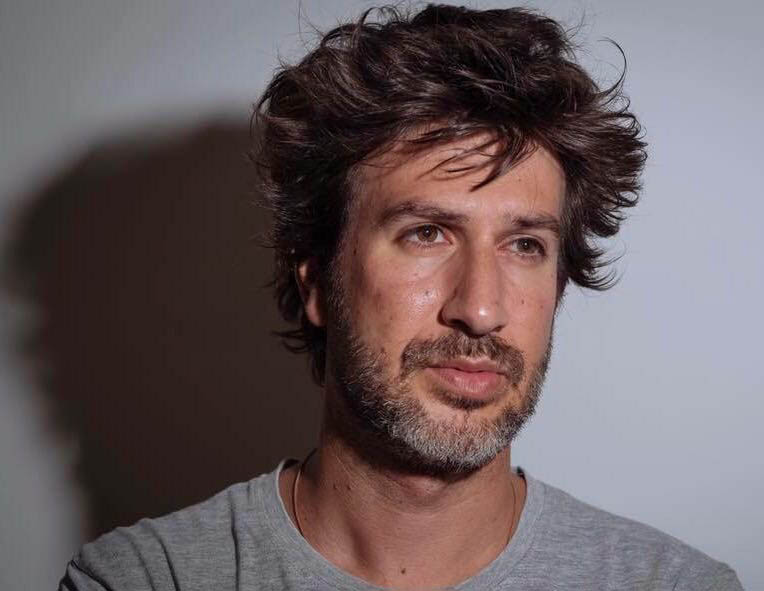
Italian journalist Lorenzo Tondo
On 10 November, like many days over the last two years, reporter Lorenzo Tondo was sitting in a courtroom in Palermo. A correspondent for The Guardian, he has been following closely the trial of an Eritrean man accused by Italian investigators of being at the helm of an international people-smuggling ring. Tondo was among the first to point out, through painstaking investigative work, that, in reality, the person standing in the dock might be a refugee, a victim in a case of mistaken identity.
So, when prosecutors announced new evidence had been filed during the latest hearing, Tondo was eager to get his hands on it. He rushed down to the records office, obtained a copy and started flicking through the hundreds of pages.
He was halfway through the documents when something odd caught his attention. His own name appeared: “Two conversations and a text between Haile Fishaye Tesfay and journalist Lorenzo Tondo, correspondent in Italy for the British newspaper The Gardian [sic] have been wiretapped,” the record states.
The investigators he had been covering for over a year, had listened to his private calls with a source and published the transcripts, in a violation of his professional rights.
“It was very hard to take in,” Tondo told Index on Censorship. “On one hand I suspected these sorts of things might be happening, knowing the environment in which I work. But I was shocked when I actually found out because I thought I had always acted in a transparent and responsible way.”
Tondo was particularly struck by how trivial the conversations published in the documents were. He was not commenting on or revealing information about any possible crime. Tesfay had been helping the reporter translate documents from Tigrinya, a language spoken in Eritrea, and they were now discussing his potential involvement in an upcoming documentary about the case. The transcript shows that, after Tesfay voiced his worries about being identified by people traffickers, Tondo assured his face would not be shown. This promise of anonymity was shattered by the investigators’ decision to release the wiretaps.
“They breached my rights,” Tondo said. “I abide by professional confidentiality and I need to defend my sources. I am not saying that journalist should be totally exempted from wiretapping if they are actually committing any crime. But if you realise the conversations are not relevant in the context of the investigation, I do not see any reason to publish them other than to discredit the person who, for over a year, has been pointing out your mistakes.”
Albeit disturbing, Tondo’s wiretapping is far from an isolated case of the Italian judiciary’s intrusion into the work of Italian reporters. Journalists have been secretly recorded on a number of recent occasions. Even more commonplace is the practice to serve media outlets or individual reporters with orders to hand over evidence and journalistic material. Just a few days after Tondo’s case emerged, officers from Guardia di Finanza, Italy’s financial police, raided the newsrooms of Il Sole 24 Ore and La Verita, two national dailies, and seized the digital archives of journalists Nicola Borzi and Francesco Bonazzi respectively. The two had just published articles, based on leaked information, detailing the links between Italy’s spying agencies and Banco Popolare di Vicenza, a bank currently in liquidation.
Although some newspapers have expressed concern and the journalists’ association denounced the violations, these episodes have largely gone unnoticed by mainstream public debate.
For Tondo, bugging a reporter or seizing their information has become so commonplace that it is not news anymore. “As wiretapping is such standard practice in Italian investigations, there are many precedents [of journalists being recorded]. So it is no longer that surprising. Italians have become dangerously inured to this, while abroad there is much more outrage.”
As Tondo pointed out, wiretapping forms an integral part of most investigations in Italy. In indictments, the bulk of the evidence is extremely likely to be drawn from secretly recorded conversations. Their wholesale use dates back to the bloody mafia wars of the early 1990s, when the Sicilian crime syndicate, Cosa Nostra, routinely killed prosecutors, judges and politicians, threatening the very foundations of the national democratic state.
In the fightback that followed, investigators have been granted wide-ranging powers. A strategy that has been successful in curbing the power of mafias, but which may have worrying side effects.
“There is a fundamental difference between the use of these tools and their abuse,” Tondo said. “In Italy many prosecutors are overusing them.”
In his case, Tondo argues that by publishing a transcript of his wiretapped conversations prosecutors might not only have violated his professional rights but also potentially broken a law.
Article 271 of the Italian criminal code forbids the use of wiretapped conversations of a range of professionals, including journalists, when they would reveal confidential information obtained because of their role.
“Even if there is no legal implication for myself, I believe it is my duty to defend my rights,” Tondo added. “This is a fair battle to fight because at stake is not only my work but, more importantly, that of many other reporters like us.”
After taking legal advice, Tondo is now evaluating the best course of action to protect himself from further intrusions. In the meantime, his work to lay bare what he believes to be an egregious miscarriage of justice continues. Despite the working situation in Palermo is becoming increasingly tough for him. Criticising the local prosecutors’ office cut his access to a steady flow of information and made many colleagues, relying on investigators for their exclusives, turn their backs on him.
“This case made me understand how visceral the relationship between journalists and the judiciary in Palermo is,” Tondo said. “Many reporters here have become press officers for the prosecutors. They have lost their independence, their impartiality. This closeness becomes a problem when that same authority makes a mistake. And if you try and leave this ‘private circle’ you become marginalised.”
[/vc_column_text][/vc_column][/vc_row][vc_row][vc_column][vc_basic_grid post_type=”post” max_items=”4″ element_width=”6″ grid_id=”vc_gid:1512050345577-4d6f8ba3-9c7a-2″ taxonomies=”193″][/vc_column][/vc_row]
31 Oct 2017 | Azerbaijan, Belarus, Czech Republic, Germany, Hungary, Italy, Malta, Media Freedom, Montenegro, News and features, Russia, Serbia
[vc_row][vc_column][vc_column_text]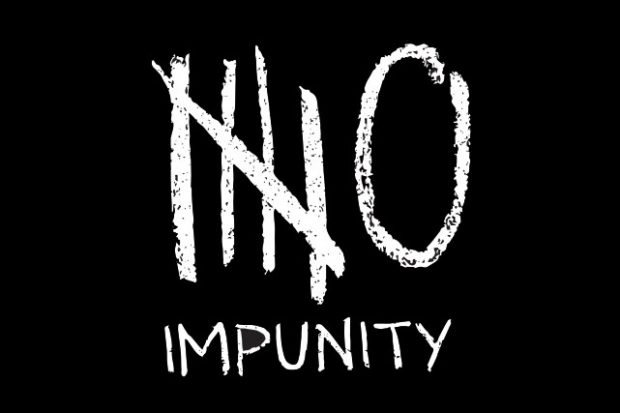
Since 2004, over 700 journalists have been killed for their reporting. Nine out of 10 of these cases go unpunished.
Index on Censorship’s Mapping Media Freedom platform verified a number of reports of impunity since it began monitoring threats to press freedom across Europe in May 2014. Reporters Without Borders also tracks cases of violence against journalists in its annual press freedom barometer and its end-of-year round-up of journalists killed worldwide.
“The brutal murder of Daphne Caruana Galizia on 16 October is a stark reminder of the dangers journalists face for reporting in the public interest. Pressure must be brought to bear on government officials in all countries to ensure that crimes against journalists do not go unpunished,” Hannah Machlin, project manager for Mapping Media Freedom, said.
Impunity, which is defined as the exemption from punishment or paying reparation for a crime, goes hand-in-hand with authorities’ inaction when investigating both violent and nonviolent actions against journalists.
“Violence against journalists and impunity for their attackers has become all too common in many parts of the world, and alarmingly, is on the rise in Europe, particularly in cases of journalists investigating corruption. We reiterate our call for the creation of a UN Special Representative for the Safety of Journalists to address this vicious cycle”, said Rebecca Vincent, UK Bureau Director for Reporters Without Borders.
To condemn such crimes, increase accountability and defend the rights of media professionals, the United Nations General Assembly proclaimed 2 November as the ‘International Day to End Impunity for Crimes Against Journalists’ in 2013. It has since been observed to raise awareness of impunity and condemn violence against the media.
AZERBAIJAN
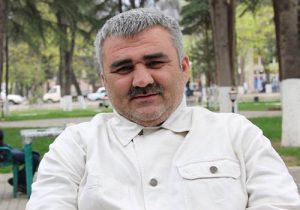
Azerbaijani journalist Afgan Mukhtarli
On 29 May 2017, investigative journalist and government critic Afgan Mukhtarli disappeared on his way home in Tbilisi, Georgia. Mukhtarli reappeared the next day across the border in Azerbaijan and was accused of illegal border crossing, resisting police and smuggling when police allegedly found €12,000 on his person. He was immediately sentenced to three months in pre-trial detention.
This case is unique in that it is the first cross-border operation alleged to be accompanied by the Georgian government. Azerbaijani lawmaker and a member of the Parliament Human Rights Committee Elman Nasirov claimed Mukhtarli’s kidnapping was “the most successful operation carried out in recent years”. Nasirov also accused him of being a member of a broader anti-Azerbaijan network. As a preventive mechanism, Nasirov claimed that Azerbaijani special forces made necessary arrangements with Georgian special forces.
Police have questioned political activists, members of opposition parties, and journalists as part of the investigation. Sevinc Vagifqizi, a freelance reporter, was detained while waiting outside the state border services where Mukhtarli was being held. Other journalists who have been questioned in the case of Mukhtarli are investigative journalist Khadija Ismayilova, who is facing a travel ban despite her release from jail, and more recently, Aytac Ahmadova.
The circumstances of Mukhtarli’s arrest were also notable for the suspicious injuries he sustained. Outside of his abduction, Mukhtarli’s lawyer reported that he had suffered a broken nose, multiple bruises and a possible broken rib.
BELARUS
On 12 March 2017, Adarya Hushtyn, the editor for BelaPAN news agency, arrived from Minsk to the town of Orsha in the Vitsebsk region of Belarus to cover a protest against the tax on the unemployed which was to be held in the early afternoon.
When she arrived that morning, she was stopped at the railway station by the commander of the riot police squad to check her documents and press card. She was then detained by police officers together with Nasha Niva newspaper correspondent Siarhei Hoodzilin who had arrived to cover the same protest.
At the police station, both journalists were searched and informed that they were being checked for in the database of wanted people. Hushtyn was detained at the police station for nearly three hours without any explanation. She was only released after the protest she intended to report on was over.
Hushtyn filed a complaint against her illegal detention and was told that she was mistaken for another woman who was also wanted by the police. As it turned out, this woman was not only unlike the journalist but was found two weeks prior to Hushtyn’s detention. She also filed an application to the prosecutor’s office to initiate a criminal case under Article 198 of the Criminal Code of the Republic of Belarus “preventing from lawful professional activity of a journalist”, but was refused.
In March 2017, the Belarusian Association of Journalists (BAJ) made an appeal to the Minister of Home Affairs calling on the authorities to investigative the mass violations of journalists’ rights. The reply was that police officers did not violate any law and that BAJ “has to stop ‘covering up’ and ‘justifying’ the people who have nothing to do with mass media”.
In March alone, 94 reporters were detained and 6 were beaten by the police while covering nationwide protests.
CZECH REPUBLIC
In April 1992, Václav Dvořák was shot and killed in front of his home. Dvořák was a journalist who uncovered information regarding František Mrázek, a controversial Czech entrepreneur once believed to be the boss of the Czech mob. Dvořák both published his reports locally or passed them along to national distributors. There are thirteen other murders thought to be linked to Dvořák’s.
After more than fourteen years, police identified Dvořák’s killer as gangster Bohuslav Hájek, who is believed to have been ordered by Mrázek to carry out the murder. However, Hájek disappeared in 2001 and it is believed that he was also murdered as an inconvenience and a witness to Mrázek’s operations.
GERMANY
On 6 July 2017 in Hamburg, Germany, police assaulted a number of journalists at the G20 protests.
Of the 35 investigations launched, 27 are accusations of assault perpetrated by police officers. At this time, none of the attackers have been arrested or convicted.
“There has been no police brutality,” Olaf Scholz, the mayor of Hamburg, claimed days after the protests during a televised interview.
On 8 July 32 journalists had their accreditation revoked by federal police without explicit reasoning. This launched an investigation by federal police, who discovered police files against the journalists contained incorrect information. Although there were errors made in police documents, it is unclear if the journalists have regained accreditation.
Journalists who lost accreditations include photographer Björn Kietzmann, Rafael Heygster (Weser Kurier), photographer for Junge Welt, Willi Effenberger Alfred Denzinger (Beobachter News), photographer Chris Grodotzki (Spiegel Online), Adil Yigit (Avrupa Postasi), editor Elsa Koester (Neues Deutschland) and freelance photographer Po Ming Cheung.
HUNGARY
On 15 July 2016 investigative journalist Csaba Móricz was insulted and then chased by the mayor of Érpatak, Orosz Mihály Zoltán, in a car. Earlier that day, Móricz went to Érpatak to document a city council meeting where he expected to ask questions to the mayor regarding a series of financial irregularities that he had uncovered.
At the beginning of the council meeting, instead of opening, the mayor launched into a fifteen-minute speech about the journalist, declaring him a “media rat” and “secret agent” several times, insinuating that Móricz lied about the financial situation in Érpatak for money. Two men then entered the room, one of which was Richárd Fügedi, a councillor of the far-right party Jobbik. One of the men then started threatening the journalist and asked: “Are you going to push me, Mr Móricz?“
The journalist left and drove away from the meeting, but soon realised that his vehicle was being followed by a group of three other cars – two of which belonged to the mayor‘s office. All cars involved were driving above the speed limit towards a nearby town when the journalist noticed a police patrol and decided to stop and ask for protection.
The police officers, instead of protecting the journalist, checked Móricz’s ID in the midst of a group of five people, including Mayor Zoltán and a second Jobbik MP. The group filmed the incident despite the journalist requesting they stop when his personal details, including his home address, were read aloud. Móricz had to insist to the police officers that they escort him to safety after initially being refused.
Just one month later, the authorities have opened an investigation against Móricz for breaking the speed limit. The investigation began when the website he works for wrote that he had to speed up to 140-150 km/h to escape his followers.
ITALY
Cosimo Cristina was born in Termini Imerese, an industrial village not far from Palermo, in 1935. He started working in the local newspaper L’Ora di Palermo when he was twenty. Later, he became a freelance contributor for several national newspapers and for the ANSA news agency.
In the late 1950’s, Cristina started to collect information about the clans of the Cosa Nostra, or the Sicilian mafia, in Palermo and Termini Imerese. In 1959 he published a new magazine titled “Prospettive Siciliane” (Sicilian Perspectives) with his friend Giovanni Capuzzo to cover stories on the mafia. This is when he started receiving death threats.
On 3 March 1960, he did not return home from work. Two days later, his corpse was discovered near to the railway, his skull broken. In his pockets he carried an ID and two letters; one for his fiancé and one for Capuzzo. In these letters Cristina begged for forgiveness for taking his own life. For the police it was a suicide and the case was closed. There was no further investigation or handwriting analysis on the letters found at the scene.
Five years later, police officer and expert on the Sicilian mafia Angelo Mangano began a new investigation. He knew Cristina had written several articles probing into the world of the Cosa Nostra. Mangano requested an autopsy on the corpse but the results confirmed the suicide, despite the doubts.
MALTA

Daphne Caruana Galizia
On 16 October at around 3pm, Daphne Caruana Galizia was killed when the car she was driving exploded in Bidnija in what is thought to have been a targeted attack. Galizia filed a police report 14 days prior saying that she was being threatened.
“The barbaric murder of Daphne Caruana Galizia is an attack on journalism itself. This crime is meant to intimidate every investigative journalist,” said Dr Lutz Kinkel, managing director of the European Centre for Press and Media Freedom.
“Because prime minister Joseph Muscat and parts of Malta’s political elite were targets of Galizia’s disclosures, we strongly recommend an independent investigation of this case. The killers have to be found and put on trial.”
On 17 October, Galizia’s family filed an application to Magistrate Consuelo Scerri Herrera to abstain from investigating the case because of the court’s “flagrant conflict of interest”. Galizia and the magistrate share a history of conflict and critique.
Galizia has conducted numerous high profile corruption investigations and has been subject to dozens of libel suits and constant harassment. Because of her research, in February, her bank assets were frozen following a request filed by the economic minister.
Galizia has made numerous opponents in the Maltese government and business world and has investigated and linked such high officials as opposition leader Adrian Deliato offshore accounts and alleged prostitution, real estate investment owner Silvio Debono to public land takeover and Prime Minister Joseph Muscat and his wife to hiding payments from Azerbaijan.
London: Vigil for Daphne Caruana Galizia
Join us to mark the International Day to End Impunity for Crimes Against Journalists by joining a vigil mourning the death of Maltese investigative journalist Daphne Caruana Galizia, who was murdered on Monday 16 October.
When: Thursday 2 November 1-2pm
Where: Malta High Commission, Malta House, 36-38 Piccadilly, Mayfair, London W1J 0LE (Map)
MONTENEGRO
On 1 November 2007 Tufik Softic, a Montenegrin journalist and reporter for the opposition daily newspaper Vijesti, was brutally beaten in front of his home in Berane by two hooded assailants wielding baseball bats. About six years later in August 2013, an explosive device was thrown into the yard of Softic’s family home. It was not until 2014 and broad international pressure on Montenegro that both cases began formally investigating.
On 17 July 2014, police arrested two men in the town of Budva under the suspicion of involvement in the attacks against Softic. After questioning by the state prosecutor, who also confiscated their passports, the men were released on the same day.
Ten years after the initial attack in February 2017, Softic filed a lawsuit against the state for ineffective investigation. The lawsuit claims that the state is responsible for mental pain and fear which Softic suffered and will suffer because of the danger of re-attack, the Trade Union of Media of Montenegro reported. The state, TUMM continued, “encouraged attackers by ineffective investigation and eventually, its ending”.
After years of stalemate, Softc initiated the trial for compensation for non-pecuniary damage related to human rights violations. He has since been awarded €7,000 as compensation for the ineffectual investigation and mental suffering he endured, becoming the first in Montenegro’s history to do so. Softic’s case is emblematic of the atmosphere of impunity in Montenegro and the broader Balkan region.
RUSSIA
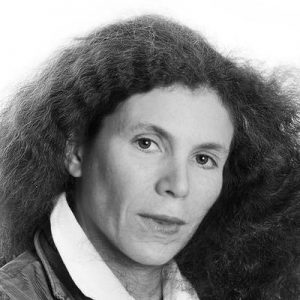
Yulia Latynina (Twitter)
After multiple life-threatening attacks, Yulia Latynina fled Russia. The columnist, contributor and writer works for independent newspaper Novaya Gazeta, as well as radio station Echo Moskvy.
“I have left Russia in connection with threats to my life,” Latynina wrote on Twitter on 10 September. A week before on 3 September, her car was set on fire and completely destroyed. On July 2017 the journalist’s car and parent’s house were sprayed with noxious gas which led to the poisoning of eight people in the surrounding area. In a third incident on August 2016, faeces were poured onto Latynina while she was on her way to work at Echo Moskvy station.
In all three cases, a proper investigation was not carried out and the perpetrators were not found.
Also in Russia, on 9 March 2016, an attack was made on a minibus carrying journalists and human rights activists, near the border between Ingushetia and Chechnya. After no suspects had been identified, the investigation was suspended in February 2017. Although Ingushetia resumed the investigation after a public backlash, no progress has been made.
SERBIA
Three controversial murder cases from the nineties and early 2000’s remain unresolved in Serbia, with the most well-known case being the murder of journalist and newspaper publisher Slavko Ćuruvija outside of his apartment in Belgrade in 1999. It is believed that the order came from senior secret service officials during the regime of strongman Slobodan Milošević. Four former state security officials have been on trial for the murder as of December 2014, which continues to progress slowly. The lack of closure to the case after nearly two decades shows the perpetuation of state impunity in Serbia even after regime change.
The suspicious death of journalist Dada Vujasinović in 1994 also remains unsolved. Vujasinović is believed to have been murdered because of her published articles regarding war criminal Željko Ražnatović, better known as Arkan. She was found dead in her apartment in 1994. The police ruled it a suicide and nobody has been arrested or prosecuted to this day.
The third case is that of Večernje Novosti journalist Milan Pantić, who was murdered in 2001. He reported on criminal affairs and official corruption. As of June 2017, the police investigation had finally been completed and suspects have been identified, awaiting a trial. All three of these cases are being investigated by an independent commission established in 2013.
UKRAINE

Pavel Sheremet (Photo: Ukrainska Pravda)
Journalist Pavel Sheremet‘s killing in a car bombing in Ukraine’s capital city on July 20, 2016, cast a chill over the country’s press corps, and the ongoing impunity for those behind the crime has continued to affect journalists’ ability to cover sensitive subjects.
Sheremet was killed when the car he was driving exploded in Kyiv. In a statement, Ukrainian police said that an explosive device detonated at 7.45am as Sheremet was driving to host a morning programme on Radio Vesti, where he had been working since 2015.
The car belonged to Sheremet’s partner, journalist Olena Prytula, who co-founded Ukrainska Pravda with murdered journalist Georgiy Gongadze.
Sheremet had been imprisoned by Belarusian authorities in 1997 for three months before being deported to Russia. Though stripped of his citizenship in 2010, he continued to report on Belarus on his personal website. He moved to the Ukrainian capital in 2011 to work for the newspaper Ukrainska Pravda.
There have been no arrests in the journalist’s murder.[/vc_column_text][/vc_column][/vc_row][vc_row][vc_column][vc_row_inner][vc_column_inner width=”1/2″][vc_single_image image=”80577″ img_size=”full” onclick=”custom_link” link=”https://www.balcanicaucaso.org/bloc-notes/Impunita-dei-crimini-contro-i-giornalisti-una-scelta-politica”][/vc_column_inner][vc_column_inner width=”1/2″][vc_column_text]
696 è il numero esatto di professionisti dell’informazione uccisi dal 2007 ad oggi nel mondo, secondo i dati raccolti dal Comitato per la Protezione dei Giornalisti (CPJ).[/vc_column_text][/vc_column_inner][/vc_row_inner][vc_row_inner][vc_column_inner width=”1/2″][vc_single_image image=”96211″ img_size=”full” onclick=”custom_link” link=”https://www.indexoncensorship.org/2017/10/targeting-journalists-name-national-security/”][/vc_column_inner][vc_column_inner width=”1/2″][vc_column_text]
As security – rather than the protection of fundamental rights and freedoms – becomes the number one priority of governments worldwide, broadly-written security laws have been twisted to silence journalists.[/vc_column_text][/vc_column_inner][/vc_row_inner][vc_row_inner][vc_column_inner width=”1/2″][vc_single_image image=”96229″ img_size=”full” onclick=”custom_link” link=”https://www.indexoncensorship.org/2017/10/turkish-injustice-scores-journalists-rights-defenders-go-trial/”][/vc_column_inner][vc_column_inner width=”1/2″][vc_column_text]
About 90 journalists, writers and human rights defenders will appear before courts in the coming days[/vc_column_text][/vc_column_inner][/vc_row_inner][vc_row_inner][vc_column_inner width=”1/2″][vc_single_image image=”96183″ img_size=”full” onclick=”custom_link” link=”https://www.indexoncensorship.org/2017/10/interpol-the-abuse-red-notices-is-bad-news-for-critical-journalists/”][/vc_column_inner][vc_column_inner width=”1/2″][vc_column_text]
Since August, at least six journalists have been targeted across Europe by international arrest warrants issued by Turkey, Azerbaijan, Uzbekistan and Kazakhstan[/vc_column_text][/vc_column_inner][/vc_row_inner][vc_custom_heading text=”Mapping Media Freedom” use_theme_fonts=”yes”][vc_separator color=”black”][vc_row_inner][vc_column_inner width=”1/4″][vc_icon icon_fontawesome=”fa fa-times-circle” color=”black” background_style=”rounded” size=”xl” align=”right”][/vc_column_inner][vc_column_inner width=”3/4″][vc_column_text]
Since 24 May 2014, Mapping Media Freedom’s team of correspondents and partners have recorded and verified over 3,600 violations against journalists and media outlets.
Index campaigns to protect journalists and media freedom. You can help us by submitting reports to Mapping Media Freedom.[/vc_column_text][/vc_column_inner][/vc_row_inner][/vc_column][/vc_row][vc_row][vc_column][vc_custom_heading text=”Don’t lose your voice. Stay informed.” use_theme_fonts=”yes”][vc_separator color=”black”][vc_row_inner][vc_column_inner width=”1/2″][vc_column_text]Index on Censorship is a nonprofit that campaigns for and defends free expression worldwide. We publish work by censored writers and artists, promote debate, and monitor threats to free speech. We believe that everyone should be free to express themselves without fear of harm or persecution – no matter what their views.
Join our mailing list (or follow us on Twitter or Facebook) and we’ll send you our weekly newsletter about our activities defending free speech. We won’t share your personal information with anyone outside Index.[/vc_column_text][/vc_column_inner][vc_column_inner width=”1/2″][gravityform id=”20″ title=”false” description=”false” ajax=”false”][/vc_column_inner][/vc_row_inner][vc_separator color=”black”][/vc_column][/vc_row]
4 Oct 2017 | Mapping Media Freedom, Media Freedom, media freedom featured, News and features
[vc_row][vc_column][vc_column_text]
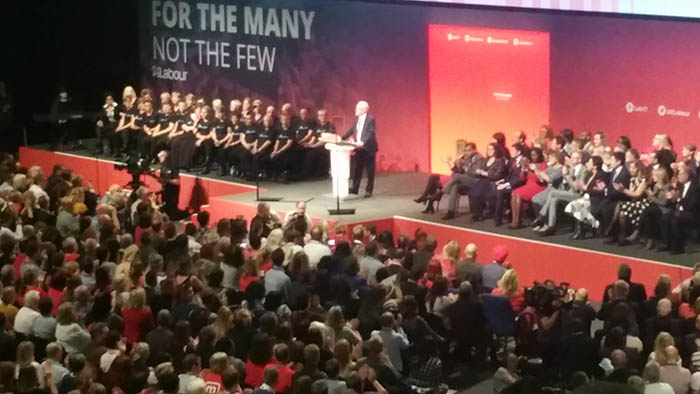
Jeremy Corbyn speaks at Labour Party conference in Brighton, September 2017. Credit: DaveLevy/Flickr
During his first speech at conference as Labour Party leader in September 2015, Jeremy Corbyn called for an end to “personal abuse” and urged delegates to “treat people with respect”.
“Cut out the cyber-bullying and especially the misogynistic abuse online,” he added. “I want kinder politics.”
Two years on the message hasn’t gotten through.
On 24 September 2017, the second day of this year’s party conference, BBC political editor Laura Kuenssberg was assigned bodyguards after receiving abusive threats online.
The BBC had also decided to bolster Kuenssberg’s personal protection during the general election in June after she faced threats over alleged bias in her reporting surrounding Labour leader Jeremy Corbyn. She has also been accused of partiality by Conservative and Ukip supporters.
“It is unprecedented that a journalist would need protection to do her job covering a political conference in the UK, which makes this all the more troubling,” Hannah Machlin, project manager for Index on Censorship’s’ Mapping Media Freedom project, said. “Laura’s case indicates that sexist online abuse against women journalists has become part of the job, and it’s affecting not only the safety of reporters but also a functioning free press.”
Two other journalists were refused entry altogether to the conference. On 23 September, Sussex police refused to give Huck magazine editor Michael Segalov a press security clearance required to attend. Segalov wrote that he applied for press accreditation three months prior to the conference but was informed the evening of 19 September that it had been denied based on the police’s refusal to grant him security clearance.
“Rather than provide reasons and rationale for our journalistic freedom being curtailed, the police said they would not divulge why they made their call,” Segalov wrote. He has never been arrested, charged or convicted of any crime.
“This might be a single incident, but the repercussions should it go unchallenged are worrying. The police restricting the rights of a journalist from attending a political event without giving any rationale, basis or reason puts our civil liberties on the line.”
On 24 September, Michael Walker, a left-wing journalist working for Novara Media, was also barred from entering by police.
“Barring reporters is a form of censorship,” Machlin added. “Political parties interfering with access to events undermines key parts of democracy and sends a clear message from the labour party to all other journalists.”
Earlier this year, Corbyn’s press team barred Buzzed from campaign events. On 9 May, in the run-up to the general election, a senior Corbyn aide told BuzzFeed News political editor Jim Waterson that his access was limited and that the website’s access to the Labour leader would be limited for the rest of the campaign. This was because of an interview with Corbyn published on 8 May had “disrupted media coverage of Labour’s launch event”, the website reported.
Buzzfeed published a piece quoting Corbyn that he remain as the party’s leader even if he lost the election. Corbyn told the BBC he had only said he would stay in power because they would win. BuzzFeed then published an extract of the interview, which showed they had quoted him accurately.
Waterson later regained access to the leader.
Such violations to media freedom are not limited to the Labour Party, however. Also in the run-up to the election, three journalists for Cornwall Live were shut in a room, prevented from filming and severely limited on what questions they could ask during Conservative prime minister Theresa May’s visit to a factory in Cornwall.
A reporter from Cornwell Live who was live-blogging the event wrote: “We’ve been told by the PM’s press team that we were not allowed to stand outside to see Theresa May arrive.”
On two occasions in April 2017, Conservative-run Thurrock Council in Essex said they would restrict access to journalists who “do not reflect the council’s position accurately”.
In the wake of the Grenfell Tower fire in June, the Kensington and Chelsea Council, which has been Conservative-run since 1964, tried to prevent journalists from attending its first after the atrocity. The council had sought to exclude the public and media from the cabinet meeting, arguing their presence would risk disorder. But after a legal challenge from five media organisations, a high court judge ordered the council to allow accredited journalists to attend half an hour before the meeting was due to start. [/vc_column_text][/vc_column][/vc_row][vc_row][vc_column][vc_basic_grid post_type=”post” max_items=”4″ element_width=”6″ grid_id=”vc_gid:1507044011187-4d3c340a-bdf9-4″ taxonomies=”6564″][/vc_column][/vc_row]
3 Oct 2017 | Mapping Media Freedom, Media Freedom, media freedom featured, News and features
[vc_row][vc_column][vc_column_text]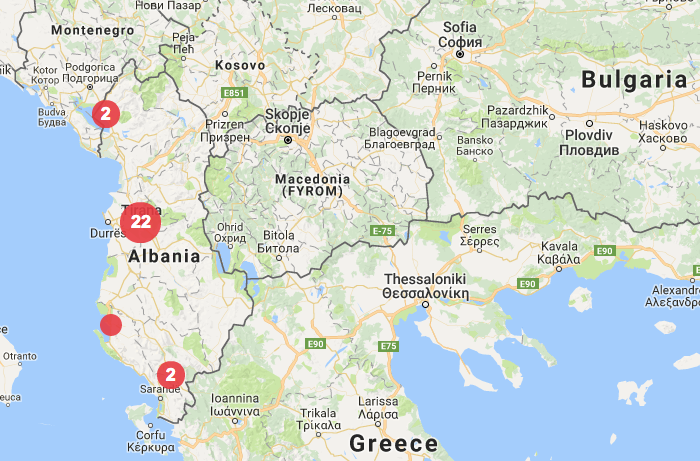
Albania’s mainstream media outlets have been reluctant to cover and expose corruption in the country, and observers blame vexatious lawsuits for the hesitancy.
In June 2017, Gjin Gjoni, a court of appeals judge in Tirana, and his wife Elona Caushi, a businesswoman, filed charges against BIRN Albania along with its journalist Besar Likmeta and Aleksandra Bogdani, and separate charges against the newspaper Shqiptarja, along with its journalists Adriatic Doci and Elton Qyno.
BIRN Albania, which specialises in investigative reporting, publishing and media monitoring, along with Likmeta and Bogdani were accused of causing the couple reputational damage and anguish, for which Gjoni and Caushi are demanding 7 million Lek (€54,000) in compensation.
The BIRN Albania journalists had written about the closure and subsequent reopening of an investigation, carried out by the High Inspectorate for Declaration and Audit of Assets and Conflicts of Interest, into Gjoni for concealing wealth, falsifying official documents and money laundering.
In another article, BIRN Albania listed Gjoni as one of the ten richest judges in the country.
In a separate lawsuit, Gjoni and Caushi, based on the same reference, are asking for 4 million Lek (€30,000) in compensation from Shqiptarja, Doci and Qyno.
Kristina Voko, the executive director of BIRN Albania, considers the lawsuit malicious in nature. She pointed to the high journalistic standards held by the organisation for the work it produces.
“We are confident we will win the case because our reporting has been in public interest and solidly based on facts,” she told Index.
Doci wrote on Facebook that he was honoured by the lawsuit and that he would not remove anything in his article about Gjoni because he considers it to be accurate.
Media organisations within the country and internationally have expressed solidarity with BIRN Albania and Shqiptarja. Many think the cases will further discourage investigative journalism, which is already scarce.
Flutura Kusari, a media lawyer, said in an article published at the website Sbunker that the Gjoni lawsuits fell under the category of Strategic Lawsuits Against Public Participation (SLAPP), which she believes are being used to intimidate Albanian journalists.
“In the SLAPP lawsuits you can see prima facie that are not based in facts and they are going to be unsuccessful in the court. With them the plaintiff does not aim to win the case, but aims to frighten and discourage journalists from further reporting issues of public interest, making them pass through long and costly court processes,” she wrote.
The Union of Albanian Journalists called for Gjoni to stand down while the case is ongoing as his position in the judicial system may influence the decisions.
Blendi Salaj, the vice chairman of Albanian Media Council, considers the case as one against investigative journalism that also aims to keep the media silent.
“There are no grounds for this case but the fact that true journalism and the dissemination of information goes against the interest of subjects whose shifty activities are revealed in the press,” he told Index.
Salaj also pointed to the large damages requested as compensation by the plaintiff.
“The amount of money they request is meant to scare, worry and intimidate journalists and outlets that expose facts they don’t want out there,” he said.
Kristina Voko also agrees that lawsuits are being used as a form of intimidation.
“It is true that during the last year, there has been an increased number of lawsuits against Albanian journalists or media outlets from judges or private companies involved in different concessionary agreements,” she told Index.
“This poses concerns related to media freedom in the country,” she said.
Investigating private companies also poses difficulties for journalists in the country. It is already a rare practice in the mainstream media as result of advertising contracts and strong ties that some of these companies have with politicians.
Albania has begun the implementation of an important judicial reform after almost two years of adopting laws that aim to clean up corruption in politics.
The reform was strongly pushed by the European Commission and the United States, and is considered crucial for Albania to advance in its bid to join the European Union.
A vetting process for all judges and prosecutors in the country supervised by an international body is underway as the first step to reform the system. [/vc_column_text][/vc_column][/vc_row][vc_row][vc_column][vc_basic_grid post_type=”post” max_items=”4″ element_width=”6″ grid_id=”vc_gid:1506959873796-92fda719-8e40-6″ taxonomies=”6564″][/vc_column][/vc_row]








